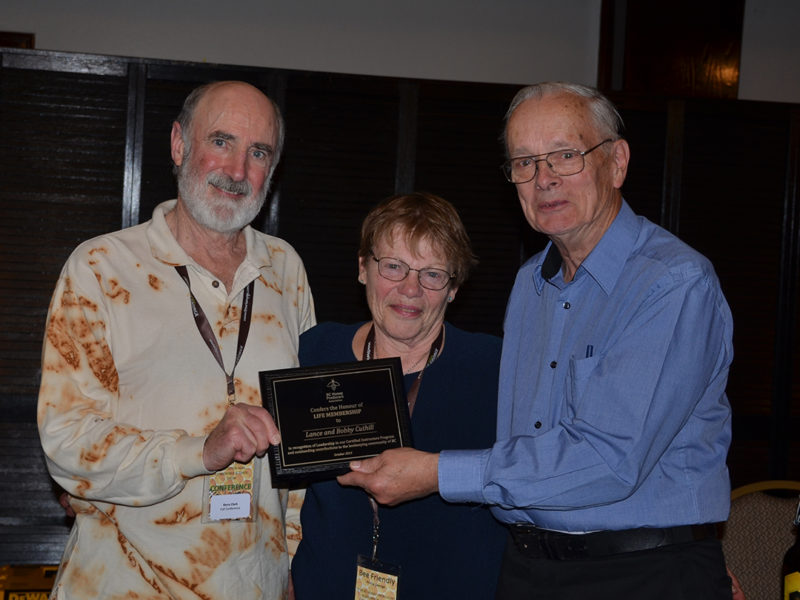by TOM WALKER
PRINCE GEORGE — The BC Honey Producers Association presented two lifetime achievement awards at its annual general meeting and conference in Prince George on October 4-6.
Lance Cuthill was honoured for his work in educating beekeepers.
“Lance’s volunteer work benefits all beekeepers across the province,” said BCHPA president Kerry Clark as he presented the award to Lance and his wife Bobby. “The program began in 2013 with three [certified instructors] and there are now 54 certified instructors who have taught over 1,200 people.”
The association also honoured former president and Duncan beekeeper Blaine Hardie, who passed away this past summer.
Stan Reist was one of several members who recounted the role Hardie and his wife Jan played in the association as well as his social contributions.
“BCHPA wouldn’t be in the position it is today without the two of them,” says Reist.
BCHPA is a much stronger organization than in the past, Jeff Lee, the outgoing first vice-president noted in his report during the association’s business meeting.
“The changes in the board have been a stabilizing force in the organization,” Lee says. “But ultimately the executive is guided by you, the membership.”
Young blood is also important.
While education days are a focal point for the association, many young apiarists can’t afford the time or money to attend.
“The education days have brought us out of debt,” Gerry Rozema of Rozehaven Farm in Campbell River observed. “But young members can’t afford to spend $600 to sit in a hotel room for three days.”
The club needs to consider ways to attract younger members to the executive, he said, noting: “There’s a lot of grey hair in this room.”
The need to cultivate new leaders comes at a time when the industry faces several challenges.
Reist, who represents BC on the Canadian Honey Council, gave the meeting an overview of the industry in his report.
In 2018, a total of 10,629 Canadian beekeepers kept 769,764 colonies producing an average of 123 pounds of honey each, or more than 93 million pounds worth $196.6 million.
But that is barely sustainable, says Reist.
“That revenue of $196 million equates to roughly $1.30 a pound, which is just above the cost of production for commercial operators on the Prairies,” he says.
Reist also discussed Germany’s planned ban on glyphosate, well-known as Roundup, which will be in effect by 2023.
“They are on the path to doing it regardless of the science that is published,” says Reist. “We do things differently.”
This includes publication by Agriculture and Agri-food Canada’s bee health roundtable, Practices to Reduce Bee Poisoning from Agricultural Pesticides, which is available at [www.pollinator.org].


 Ranchers voice ALR concerns at public meetings
Ranchers voice ALR concerns at public meetings